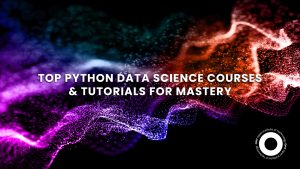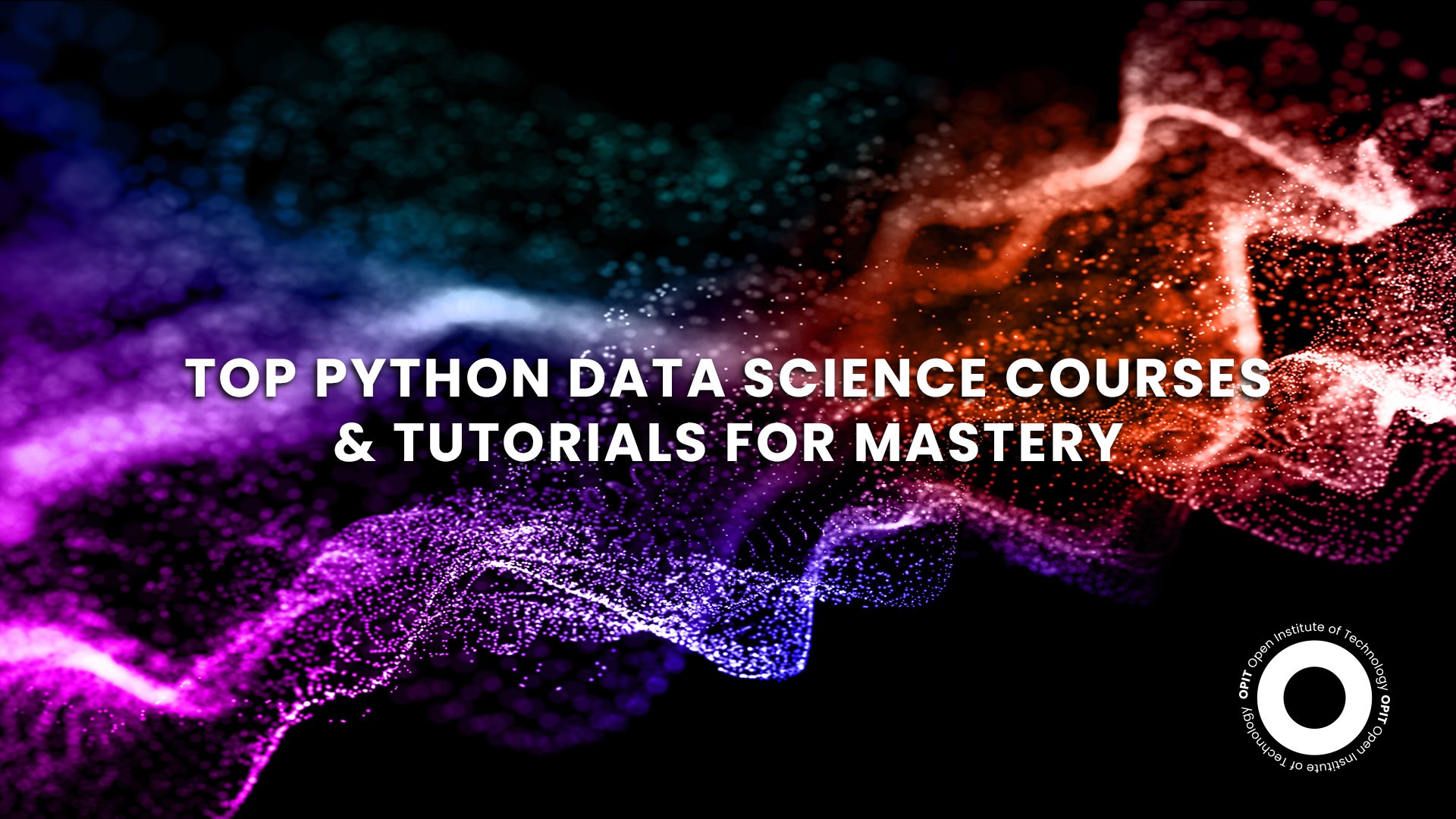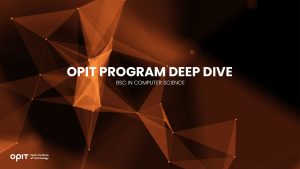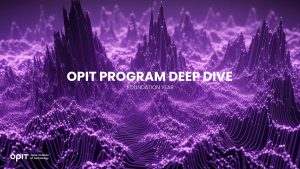

As a well-known programming language, Python dominates the data science field. Its prominence in the industry represents the main reason why so many job offers include Python skills as a hard requirement.
Of course, all of the hype around Python has practical ramifications. This programming language is suitable for people without a programming background. If you have a sufficient grasp of technology, chances are you’ll get how Python works in a few weeks.
Besides being beginner-friendly, Python is practically built for math and statistical analysis. Plus, data visualization becomes nearly effortless when you use specific Python libraries dedicated to the task.
The point is that Python makes numerous data science tasks and operations easier. If you’re interested in data science, learning this versatile programming language will take your professional development to a new level.
Fortunately, you can find plenty of courses teaching everything from the basics to advanced functions in Python. Let’s look at the best Python data science tutorial and course options.
Factors to Consider When Choosing a Python Data Science Course
Before you start a particular course, it would be best to consider the specifics. The criteria that should guide your decision include:
- The content of the course: Some courses will be introductory, while others will offer advanced lessons. You should start with a course that aligns with your proficiency level.
- Instructor’s expertise: Ideally, you’ll want an industry expert to teach you about Python. Experienced lecturers or proven professionals will know all of the ins and outs, and they’ll be able to transfer that knowledge to you.
- Course duration and flexibility: If you’re looking for a course, you don’t want an experience that will last an entire year. On the other hand, you shouldn’t expect too much from an hour-long course. Additionally, the course structure should be flexible enough to allow you to complete it at your own pace.
- Practical projects and applications: Python is a living programming language that sees plenty of use in the real world. On that note, the course you take should offer a hands-on experience and show you how to apply your new knowledge in practice.
- Course reviews and ratings: Although this shouldn’t be your primary clue when making a decision, taking a look at what others say about the course certainly won’t hurt. You’ll want to stay away from courses with mostly negative reviews, especially if the reviewers make unsubstantiated claims.
- Pricing and value: Course pricing may vary from ludicrously expensive to free. While our list doesn’t include any outrageously overpriced courses, you’ll find a quality free one in there. The bottom line here is straightforward: Does the course fit in with your budget and what do you get for the price?
Top Python Data Science Courses and Tutorials
ILX Group – Python E-Learning
This Python data science course deals with the basic functionality of the programming language and teaches you how to apply it in practice. It contains in-depth information about command running, dictionaries, methods, and shell scripting. No final exam is necessary to complete the course.
Key Topics
- The basics of Python programming
- File and data operations
- Logging and test infrastructure
- Conditional statements
- Networking
- Shell scripting
- Django web framework
Instructor’s Background
Information about the instructor for this course isn’t available on ILX Group.
Course Duration and Format
The course is in e-learning format and is delivered entirely online. It will take you about eight hours to complete. Instead of a final exam, you’ll complete the course by submitting the required project that must meet specific set criteria.
Pricing and Enrollment
Enrolling in this course will cost €450 +VAT. You won’t need to fulfill any additional requirements to make a start. Paying the one-time fee will grant you a full year of access to the course resources.
Pros
- Provides a solid foundation for Python programming
- No limitations on enrollment or availability
- Offers practical knowledge and projects
Cons
- E-learning tools used throughout the course aren’t defined
- No information about the instructor or their credentials
Python Institute – Data Analysis Essentials With Python
The Python Institute is a group devoted to Python education. The Data Analysis Essentials with Python is only one of the courses this institution provides. It’s an intermediate-level program focused on data analysis using the tools within the Python programming language.
Key Topics
- Data analysis
- Algorithmic and analytical thinking
- Data visualization
- Statistics
- Data mining and modeling
- Programming
- Data-based decision-making
Instructor’s Background
No instructor information can be found on the Python Institute site regarding this particular course. However, it’s worth mentioning that the institute is run by industry experts with substantial experience in the IT sector. These experts are also responsible for the institute courses.
Course Duration and Format
The Data Analysis Essentials with Python course will last for up to six weeks, provided you devote about eight hours weekly to studying the material. The course is delivered online.
Pricing and Enrollment
One of the greatest advantages of this course is its pricing: Data Analysis Essentials with Python is completely free. However, this course isn’t for beginners. You’ll need previous knowledge of the key concepts in Python programming. The Python Institute recommends completing their beginner courses or coming into this program with some experience.
Pros
- Course designed by industry professionals
- Free for all users
- May serve as a preparatory course for Python Certified Associate in Data Analytics (PCAD) certification
Cons
- No information about the lecturer
- Exact delivery methods aren’t specified
Python-Course – Fundamental Python Course
The Fundamental Python Course is designed as a comprehensive introduction to programming methods in Python. The course will take you through the fundamentals of the programming language and include practical solutions in the Python environment.
Key Topics
- Python introductory lessons
- Script editing and execution
- Working in the Python shell
- Expressions, operators, assignments, and variables
- Dictionaries, stacks, loops, and lists
- Handling files and exceptions
- Conditional statements
- Packages and modules
Instructor’s Background
The instructor for live courses is Bernd Klein. A Python expert with a Saarland University diploma in Computer Science, specializing in computer languages, Klein has taught at the Saarland University, EWH, Koblenz, and the University of Freiburg, where he still holds a teaching position.
Klein is also the founder of the programming language teaching platform, Bodenseo.
Course Duration and Format
The course lasts for five days and includes a live class format. While Klein usually holds classes in person, courses are currently provided online. To participate on this course, you’ll need a network-ready computer with a microphone. No additional software is needed.
Pricing and Enrollment
The on-site variant of the course costs €1,450 per day, while open classes start from €349 daily. There are no other requirements for the course.
Pros
- Taught by an experienced lecturer
- Offers a complete coverage of Python-related subjects
- Advanced optional topics
Cons
- Very pricey compared to the competitors
- Doesn’t provide a certificate
Additional Resources for Mastering Python Data Science
If you want an alternative to an actual Python data science course, you may wish to turn to other resources that will help you master the subject. In particular, these would be books and digital resources like forums, eBooks, podcasts, YouTube channels, websites, and blogs.
For some of the best Python forums and online communities, check out the following:
- Python org forums
- StackOverflow Python forum page
- FreeCodeCamp Python category
Great books on Python include:
- Head-First Python, by Paul Barry
- Think Python, by Allen B. Downey
- Learn Python 3 the Hard Way, by Zed A. Shaw
- Python Crash Course, by Eric Matthes
If printed media isn’t your style, you can find an excellent list of free Python eBooks on Codeburst.io.
On the other hand, you might not want to read too much while learning Python. In that case, you’ll be glad to learn that there are numerous podcasts on the subject that you can tune in to right now:
Unsurprisingly, YouTube also has plenty of Python data science course and tutorial channels. Here are our top picks:
- The New Boston
- Sentdex
- Real Python
- PyCon – This isn’t a particular YouTube channel, but rather a search query. Browse the search results on YouTube, and you’ll find videos for Python-dedicated conferences from around the world.
- Michael Kennedy
Finally, there’s an abundance of blogs and websites dedicated to Python resources and knowledge:
- Python Blogs
- The PyCharm Blog on Jet Brains
- The Invent with Python Blog
- The Python Library Blog
- Finxster
Learn to Program in Python Like a Pro
The internet is full of quality Python data science tutorial and course pages. You can find free and premium resources to hone your skills in the programming language or get familiar with the fundamental concepts.
Whichever resource type you choose, rest assured that learning practical Python skills will be a valuable addition to your resume. After all, data science is a constantly developing field in which expanding your knowledge base and skillset can only be a huge plus. If you’ve found a program you like in this article, don’t hesitate to jump right into it and expand your horizons.
Related posts

Computer Science is fast becoming one of the most valuable fields of study, with high levels of demand and high-salaried career opportunities for successful graduates. If you’re looking for a flexible and rewarding way to hone your computing skills as part of a supportive global community, the BSc in Computer Science at the Open Institute of Technology (OPIT) could be the perfect next step.
Introducing the OPIT BSc in Computer Science
The OPIT BSc in Computer Science is a bachelor’s degree program that provides students with a comprehensive level of both theoretical and practical knowledge of all core areas of computer science. That includes the likes of programming, databases, cloud computing, software development, and artificial intelligence.
Like other programs at OPIT, the Computer Science BSc is delivered exclusively online, with a mixture of recorded and live content for students to engage with. Participants will enjoy the instruction of world-leading lecturers and professors from various fields, including software engineers at major tech brands and esteemed researchers, and will have many paths open to them upon graduation.
Graduates may, for example, seek to push on with their educational journeys, progressing on to a specialized master’s degree at OPIT, like the MSc in Digital Business and Innovation or the MSc in Responsible Artificial Intelligence. Or they could enter the working world in roles like software engineer, data scientist, web developer, app developer, or cybersecurity consultant.
The bullets below outline the key characteristics of this particular course:
- Duration: Three years in total, spread across six terms.
- Content: Core courses for the first four terms, a student-selected specialization for the fifth term, and a capstone project in the final term.
- Focus: Developing detailed theoretical knowledge and practical skills across all core areas of modern computer science.
- Format: Entirely online, with a mixture of live lessons and asynchronous content you can access 24/7 to learn at your own pace.
- Assessment: Progressive assessments over the course of the program, along with a capstone project and dissertation, but no final exams.
What You’ll Learn
Students enrolled in the BSc in Computer Science course at OPIT will enjoy comprehensive instruction in the increasingly diverse sectors that fall under the umbrella of computer science today. That includes a close look at emerging technologies, like AI and machine learning, as well as introductions to the fundamental skills involved in designing and developing pieces of software.
The first four terms are the same for all students. These will include introductions to software engineering, computer security, and cloud computing infrastructure, as well as courses focusing on the core skills that computer scientists invariably need in their careers, like project management, quality assurance, and technical English.
For the fifth term, students will have a choice. They can select five electives from a pool of 27, or select one field to specialize in from a group of five. You may choose to specialize in all things cybersecurity, for example, and learn about emerging cyber threats. Or you could focus more on specific elements of computer science that appeal to your interests and passions, such as game development.
Who It’s For
The BSc in Computer Science program can suit a whole range of prospective applicants and should appeal to anyone with an interest or passion for computing and a desire to pursue a professional career in this field. Whether you’re seeking to enter the world of software development, user experience design, data science, or another related sector, this is the course to consider.
In addition, thanks to OPIT’s engaging, flexible, and exclusively online teaching and learning systems, this course can appeal to people from all over the globe, of different ages, and from different walks of life. It’s equally suitable for recent high school graduates with dreams of making their own apps to seasoned professionals looking to broaden their knowledge or transition to a different career.
The Value of the BSc in Computer Science Course at OPIT
Plenty of universities and higher education establishments around the world offer degrees in computer science, but OPIT’s program stands out for several distinctive reasons.
Firstly, as previously touched upon, all OPIT courses are delivered online. Students have a schedule of live lessons to attend, but can also access recorded content and digital learning resources as and when they choose. This offers an unparalleled level of freedom and flexibility compared to more conventional educational institutions, putting students in the driving seat and letting them learn at their own pace.
OPIT also aims not merely to impart knowledge through lectures and teaching, but to actually help students gain the practical skills they need to take the next logical steps in their education or career. In other words, studying at OPIT isn’t simply about memorizing facts and paragraphs of text; it’s about learning how to apply the knowledge you gain in real-world settings.
OPIT students also enjoy the unique benefits of a global community of like-minded students and world-leading professors. Here, distance is no barrier, and while students and teachers may come from completely different corners of the globe, all are made to feel welcome and heard. Students can reach out to their lecturers when they feel the need for guidance, answers, and advice.
Other benefits of studying with OPIT include:
- Networking opportunities and events, like career fairs, where you can meet and speak with representatives from some of the world’s biggest tech brands
- Consistent support systems from start to finish of your educational journey in the form of mentorships and more
- Helpful tools to expedite your education, like the OPIT AI Copilot, which provides personalized study support
Entry Requirements and Fees
To enroll in the OPIT BSc in Computer Science and take your next steps towards a thrilling and fulfilling career in this field, you’ll need to meet some simple criteria. Unlike other educational institutions, which can impose strict and seemingly unattainable requirements on their applicants, OPIT aims to make tech education more accessible. As a result, aspiring students will require:
- A higher secondary school leaving certificate at EQF Level 4, or equivalent
- B2-level English proficiency, or higher
Naturally, applicants should also have a passion for computer science and a willingness to study, learn, and make the most of the resources, community, and support systems provided by the institute.
In addition, if you happen to have relevant work experience or educational achievements, you may be able to use these to skip certain modules or even entire terms and obtain your degree sooner. OPIT offers a comprehensive credit transfer program, which you can learn more about during the application process.
Regarding fees, OPIT also stands out from the crowd compared to conventional educational institutions, offering affordable rates to make higher tech education more accessible. There are early bird discounts, scholarship opportunities, and even the option to pay either on a term-by-term basis or a one-off up-front fee.

The Open Institute of Technology (OPIT) provides a curated collection of courses for students at every stage of their learning journey, including those who are just starting. For aspiring tech leaders and those who don’t quite feel ready to dive directly into a bachelor’s degree, there’s the OPIT Foundation Program. It’s the perfect starting point to gain core skills, boost confidence, and build a solid base for success.
Introducing the OPIT Foundation Year Program
As the name implies, OPIT’s Foundation Program is about foundation-level knowledge and skills. It’s the only pre-bachelor program in the OPIT lineup, and successful students on this 60-ECTS credit course will obtain a Pre-Tertiary Certificate in Information Technology upon its completion. From there, they can move on to higher levels of learning, like a Bachelor’s in Digital Business or Modern Computer Science.
In other words, the Foundation Program provides a gentle welcome into the world of higher technological education, while also serving as a springboard to help students achieve their long-term goals. By mixing both guided learning and independent study, it also prepares students for the EQF Level 4 experiences and challenges they’ll face once they enroll in a bachelor’s program in IT or a related field.
Here’s a quick breakdown of what the OPIT Foundation Program course involves:
- Duration: Six months, split into two terms, with each term lasting 13 weeks
- Content: Three courses per term, with each one worth 10 ECTS credits, for a total of 60
- Focus: Core skills, like mathematics, English, and introductory-level computing
- Format: Video lectures, independent learning, live sessions, and digital resources (e-books, etc.)
- Assessment: Two to three assessments over the course of the program
What You’ll Learn
The OPIT Foundation Program doesn’t intensely focus on any one particular topic, nor does it thrust onto you the more advanced, complicated aspects of technological education you would find in a bachelor’s or master’s program. Instead, it largely keeps things simple, focusing on the basic building blocks of knowledge and core skills so that students feel comfortable taking the next steps in their studies.
It includes the following courses, spread out across two terms:
- Academic Skills
- Mathematics Literacy I
- Mathematics Literacy II
- Internet and Digital Technology
- Academic Reading, Writing, and Communication
- Introduction to Computer Hardware and Software
Encompassing foundational-level lessons in digital business, computer science, and computer literacy, the Foundation Program produces graduates with a commanding knowledge of common operating systems. Exploring reading and writing, it also helps students master the art of communicating their ideas and responses in clear, academic English.
Who It’s For
The Foundation Year program is for people who are eager to enter the world of technology and eventually pursue a bachelor’s or higher level of education in this field, but feel they need more preparation. It’s for the people who want to work on their core skills and knowledge before progressing to more advanced topics, so that they don’t feel lost or left behind later on.
It can appeal to anyone with a high school-level education and ambitions of pushing themselves further, and to anyone who wants to work in fields like computer science, digital business, and artificial intelligence (AI). You don’t need extensive experience or qualifications to get started (more on that below); just a passion for tech and the motivation to learn.
The Value of the Foundation Program
With technology playing an increasingly integral role in the world today, millions of students want to develop their tech knowledge and skills. The problem is that technology-oriented degree courses can sometimes feel a little too complex or even inaccessible, especially for those who may not have had the most conventional educational journeys in the past.
While so many colleges and universities around the world simply expect students to show up with the relevant skills and knowledge to dive right into degree programs, OPIT understands that some students need a helping hand. That’s where the Foundation Program comes in – it’s the kind of course you won’t find at a typical university, aimed at bridging the gap between high school and higher education.
By progressing through the Foundation Program, students gain not just knowledge, but confidence. The entire course is aimed at eliminating uncertainty and unease. It imbues students with the skills and understanding they need to push onward, to believe in themselves, and to get more value from wherever their education takes them next.
On its own, this course won’t necessarily provide the qualifications you need to move straight into the job market, but it’s a vital stepping stone towards a degree. It also provides numerous other advantages that are unique to the OPIT community:
- Online Learning: Enjoy the benefits of being able to learn at your own pace, from the comfort of home, without the costs and inconveniences associated with relocation, commuting, and so on.
- Strong Support System: OPIT professors regularly check in with students and are on hand around the clock to answer queries and provide guidance.
- Academic Leaders: The OPIT faculty is made up of some of the world’s sharpest minds, including tech company heads, experienced researchers, and even former education ministers.
Entry Requirements and Fees
Unlike OPIT’s other, more advanced courses, the Foundation Program is aimed at beginners, so it does not have particularly strict or complex entry requirements. It’s designed to be as accessible as possible, so that almost anyone can acquire the skills they need to pursue education and a career in technology. The main thing you’ll need is a desire to learn and improve your skills, but applicants should also possess:
- English proficiency at level B2 or higher
- A Secondary School Leaving Certificate, or equivalent
Regarding the fees, OPIT strives to lower the financial barrier of education that can be such a deterrent in conventional education around the world. The institute’s tuition fees are fairly and competitively priced, all-inclusive (without any hidden charges to worry about), and accessible for those working with different budgets.
Given that all resources and instruction are provided online, you can also save a lot of money on relocation and living costs when you study with OPIT. In addition, applicants have the option to pay either up front, with a 10% discount on the total, or on a per-term basis, allowing you to stretch the cost out over a longer period to ease the financial burden.
Have questions?
Visit our FAQ page or get in touch with us!
Write us at +39 335 576 0263
Get in touch at hello@opit.com
Talk to one of our Study Advisors
We are international
We can speak in:


